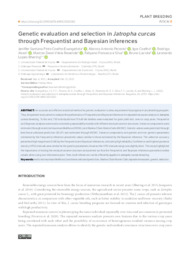Genetic evaluation and selection in jatropha curcas through frequentist and bayesian inferences.
Genetic evaluation and selection in jatropha curcas through frequentist and bayesian inferences.
Author(s): EVANGELISTA, J. S. P. C.; PEIXOTO, M. A.; COELHO, I.; ALVES, R.; RESENDE, M. D. V. de; SILVA, F. F. e; LAVIOLA, B.; BHERING, L. L.
Summary: An accurate and efficient statistical method for genetic evaluation is a key requirement for progress in any breeding program. Thus, the present study aimed to evaluate the performance of Frequentist and Bayesian inferences for repeated measures analysis in Jatropha curcas breeding. To this end, 730 individuals from 73 half-sib families were evaluated for grain yield trait, over six crop years. Frequentist and Bayesian analyses were made considering repeatability models with different residual variance structures. Variance components were estimated through restricted maximum likelihood (REML) and Markov Chain Monte Carlo (MCMC). Genetic values were predicted through best linear unbiased prediction (BLUP) and estimated through MCMC. Variance components and genetic and non-genetic parameters estimated by the Frequentist inference presented values similar to those estimated by the Bayesian inference. The selective accuracy presented high magnitude (0.84) by the Frequentist and Bayesian inferences, indicating high reliability. Confidence and highest posterior density (HPD) intervals were similar for the genetic parameters, however the HPD intervals range was slightly short. This study highlighted the importance of testing the residual variance structure and pointed out that the Frequentist and Bayesian inferences presented similar results when using non-informative prior. Then, both inferences can be efficiently applied in Jatropha curcas breeding.
Publication year: 2022
Types of publication: Journal article
Unit: Embrapa Coffee
Observation
Some of Embrapa's publications are published as ePub files. To read them, use or download one of the following free software options to your computer or mobile device. Android: Google Play Books; IOS: iBooks; Windows and Linux: Calibre.
Access other publications
Access the Agricultural Research Database (BDPA) to consult Embrapa's full library collection and records.
Visit Embrapa Bookstore to purchase books and other publications sold by Embrapa.

